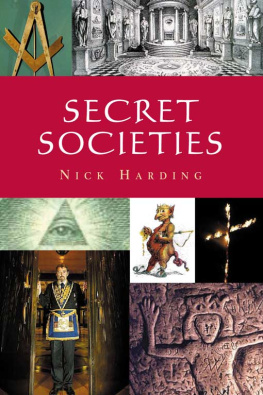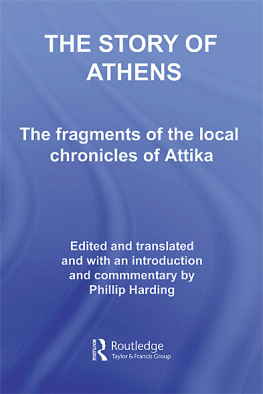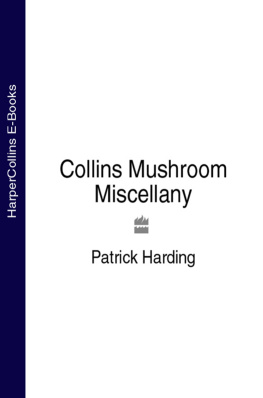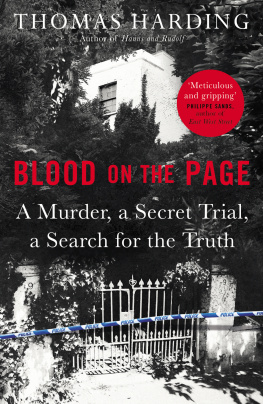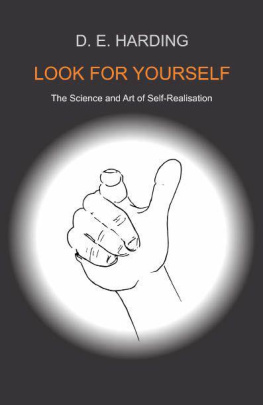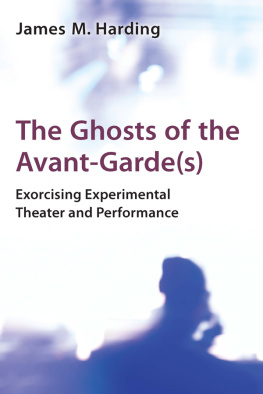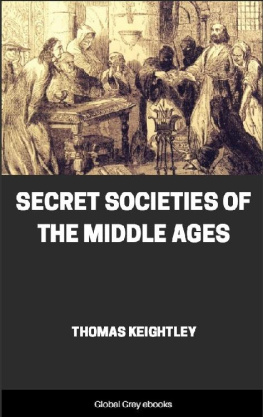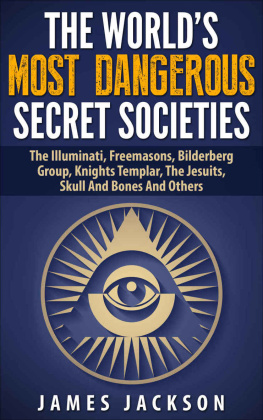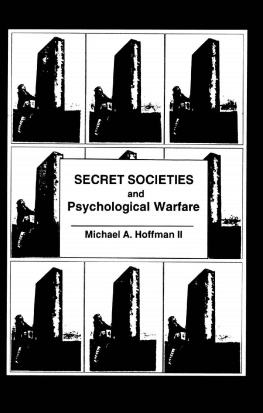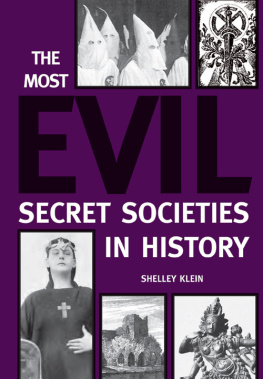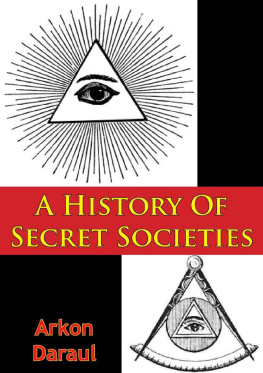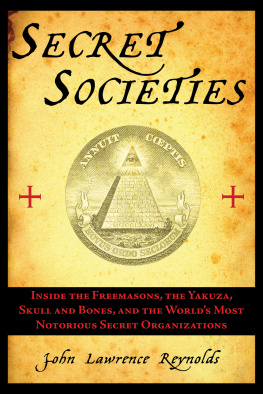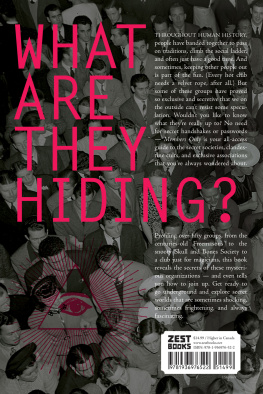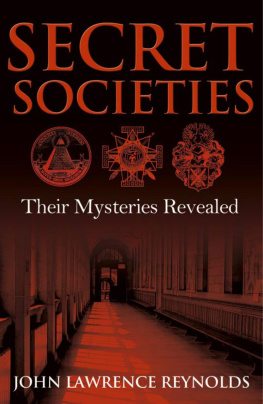Other titles by this author
Urban Legends
Secret Societies
NICK HARDING
POCKET ESSENTIALS
This edition published in 2005 by Pocket Essentials
P.O.Box 394, Harpenden, Herts, AL5 1XJ
www.pocketessentials.com
Distributed in the USA by Trafalgar Square Publishing, P.O. Box 257, Howe Hill Road, North
Pomfret,Vermont 05053
Nick Harding 2005
The right of Nick Harding to be identified as author of this work has been asserted in accordance with the Copyright, Designs and Patents Act 1988
All rights reserved. No part of this book may be reproduced, stored in or introduced into a retrieval system, or transmitted, in any form or by any means (electronic, mechanical, photocopying, recording or otherwise) without the written permission of the publishers.
Any person who does any unauthorised act in relation to this publication may be liable to criminal prosecution and civil claims for damages.
A CIP catalogue record for this book is available from the British Library.
eISBN 978 1 84839 325 7
Dedicated to the memory of Steve Redwood Who fell too soon on his journey You will be missed.
For XTC and their music, thank you boys. Carl Sagan, Richard Dawkins, Michael Shermer and James Randi for showing the way in this demon-haunted world. Mo for just being her. Mike Gutsell and our reunion pint in the Dolphin and to Sean Martin who was a fellow witness to the explod ing toilet in Cannes. I would also like to thank Nick Rennison for his alchemical skills with the text.
Contents
Introduction 9
The Secret Societies 19
The Assassins 23
The Bilderberg Group 27
The Bohemian Grove 34
The Castrators of Russia 37
The Cathars 43
The Charcoal Burners 45
The Cult of Abramelin 48
The Cult of the Black Mother 50
The Cult of Mithra 51
The Decided Ones of Jupiter the Thunderer 57
The Freemasons 58
The Garduna 63
The Gnostics 67
The Golden Dawn 73
The Hell Fire Club 75
The High Priesthood of Thebes 81
The Himalayan Masters 82
The Holy Vehm 83
The Illuminati 86
The John Birch Society 91
The Knights of Malta 92
The Knights of St Columba 95
The Knights Templar 96
The Ku Klux Klan 100
The Mafia 102
The Society of Merchant Venturers 104
The Odd Fellows 105
Opus Dei 106
The Order of the Peacock Angel 110
The Ordines 111
P2 113
Prieur de Sion 116
The Rosicrucians 119
The Royal Antediluvian Order of Buffaloes 123
The Shriners 125
The Skull and Bones 127
The Sufis 132
The Thugee 134
The Triads 138
Other Secret Societies 141
Conclusions 143
Bibliography 149
On the Web 151
Introduction
'Entre nous, c'est qu'on apelle
Le secret de Polichinelle'
La Mascotte, II, 12
Secret societies have existed in human society for thousands of years. In a sense the term 'secret society' is something of a misnomer as they are often very much in the public eye. In re ality they are societies with apparent secrets and nothing more but it is often those supposed 'secrets' that garner the most attention. What troubles the majority of people is the presumed social effect these organisations have and their re lationship to the democratic process. But are such anxieties justified? Are the Freemasons really running the world? If they are, how does this fit into the way the Bilderberg Group see things? Is the idea of a New World Order something on the agenda for the Skull and Bones or is it the sole raison d'tre for the Illuminati? Do they all want to rule the world? If so, is there a hidden, worldwide war underway with each secret so ciety vying for position with the others? Secret societies are illegal in several countries. In the European Union for exam ple, Poland has made the ban a part of its constitution. Are they right to do so? Do these predominantly male-only or ganisations really crave world domination? Are they manipu lating the media and brainwashing the populations of the world? Or are they just private clubs in which like-minded men can congregate together to relax and enjoy a convivial evening in each other's company?
Undoubtedly the desire to be part of some social elite, something that all humans feel at some time in their lives, is at work here.There is a desire to be separate from the 'ordi nary' masses or to be part of something special, linked to the belief that becoming a member of an elite will bestow rich rewards, fiscal or otherwise. One criticism levelled at the Freemasons, for example, is that it is a business club in which deals are struck and a policy of 'you scratch my back, I'll scratch your back' is the rule.Yet, if this is the main objection to them, why is this criticism not aimed at an organisation such as the Lions club? This is not 'secret' but its members will, like the Freemasons, go out of their way to assist each other. Is that not what all groups do? What is it about the Freemasons and other secret societies that arouses the wrath of outsiders and distinguishes them from other social group ings?
All claim to hold secret knowledge that no one else does. All claim to be the holders of some form of truth. All claim to be the 'chosen' while considering all non-members, the laity, as outsiders and heathens who are ignorant and, in some cases, blind to 'reality'. All have initiation ceremonies, from the sublime to the alarming, that allow the acolyte to feel that they have entered something special. There is a purification element to these ceremonies in which the old world is 'washed away' and a new world entered. In this new world the new member can become party to the secret wisdom the only secret wisdom worth knowing.
Often this so-called secret wisdom is just a way to secure the attentions of the newly recruited a means of confound ing the senses, promoting devotion and demanding the atten tions of the acolyte. The Knights Templar were rumoured to know the whereabouts of the treasure of the Temple of Solomon and were alleged to be protecting the secret of the Holy Grail. The reality was less startling but the lure of the unknown is what makes these secret orders psychologically appealing. Perhaps, people think, even more arcane knowl edge and more dramatic information that may surprise, anger, alarm or even amaze depending on one's point of view or religious persuasion may be in the hands of these orders.The classic 'secret' of this kind popularised through such books as Lincoln, Baigent and Leigh's The Holy Blood andthe Holy Grail and Dan Brown's The Da Vinci Code is that Jesus did not die on the cross and that Mary Magdalene, his wife, moved to the south of France, carrying his child.
Of course, these aspects of the secret societies based on Judao-Christian beliefs will be more predominant in Europe, the Middle East and North America. Elsewhere in the world such stories will have little or no meaning.The Tongs, for in stance, have their secrets but they do not involve the activities of Jesus Christ and any family he may or may not have estab lished in ancient Gaul.

